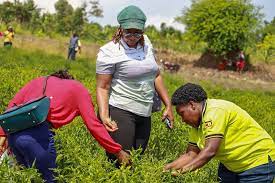Uganda’s fresh fruit and vegetable export sector has raised concerns over increasing threats due to a rise in interceptions at international borders, particularly in the European Union market..
During a stakeholder engagement in Kampala, exporters highlighted that the primary causes of these interceptions include harmful organisms like pests, chemical residues, and documentation errors.
Samuel Balagadde, Chairman of Hortifresh Association Uganda Limited, explained that Uganda’s fresh produce export sector has faced significant setbacks in recent years, with the growing number of interceptions posing a serious threat to market access and industry growth.
“These interceptions have affected a range of products, including capsicums, eggplants, and soursop,” Balagadde said.
In response to these challenges, he noted that the association launched a project aimed at raising awareness and building the capacity of stakeholders to ensure Uganda’s produce meets international standards and reduce interceptions.
“The purpose of this project is to create awareness about interceptions and decrease their occurrence by building the capacity of key players in the sector,” Balagadde explained.
The initiative emphasises safe farming practices for international markets, particularly focusing on capsicums and white eggplants, which are among Uganda’s main fresh produce exports.
“Continuous training is crucial to keep up with evolving market requirements, emerging pests, and new farming innovations,” Balagadde added, stressing that this approach is essential for maintaining compliance with international standards and ensuring Uganda’s competitiveness in global markets.
On the policy front, Hortifresh is promoting private-sector self-monitoring and advocating for the implementation of the draft Sanitary and Phytosanitary (SPS) policy.
“We are pushing for the draft SPS policy to be adopted, as access to key markets depends on addressing traceability and sanitary standards throughout the value chain,” he noted.
Former Agriculture Minister Victoria Sekitoleko called for a collective effort to ensure all players in Uganda’s agricultural sector participate fully in the value chain. She emphasized that active involvement across the entire value chain is vital for the sector’s growth and stability.
“If everyone in the value chain does their part, many of the challenges such as market inefficiencies and resource allocation issues will be resolved,” Sekitoleko said.
She also highlighted the need for better information management, pointing out that many stakeholders are unaware of critical opportunities like government subsidies due to poor communication within the sector.
“You are not part of the value chain, and because of how we manage our information, you don’t know,” Sekitoleko said, referring to the gaps that prevent many from accessing available government support.
As Uganda’s agricultural sector faces challenges from low productivity to limited access to modern technologies, Sekitoleko’s call for a more efficient, integrated value chain underscores the need for broader stakeholder engagement to boost the country’s agricultural output and global competitiveness.
Dr. Caroline Nankinga, Assistant Commissioner for Phytosanitary and Quarantine Inspection Services, warned that failure to adhere to regulations could result in continued interceptions, leading to massive financial losses for Uganda.
“We need to follow good agricultural practices (GAP) and utilize the existing agronomic guidelines,” Dr. Nankinga urged, highlighting the necessity for farmers and exporters to implement proper practices.
She also raised concerns about non-compliance, noting that Uganda lost over Shs 128 billion between May and September 2023 due to intercepted consignments, with Shs 48 million lost directly by five companies whose shipments were destroyed.
“If we continue like this, how will we stay in business?” Nankinga questioned, adding that some exporters mix ripe produce with untested goods, further contributing to the problem.
To address this, the Ministry plans to remove non-compliant exporters from the registry. “This system will help us weed out those who are not active, ensuring that only those following the rules remain in business,” she said.
Nankinga stressed the importance of coordinated efforts between farmers, exporters, and regulatory bodies to ensure that Uganda’s agricultural products meet international standards.
Proper practices at the farm level, adherence to guidelines, and reskilling workers are essential to reduce the risk of interceptions and enhance Uganda’s competitiveness in export markets.


